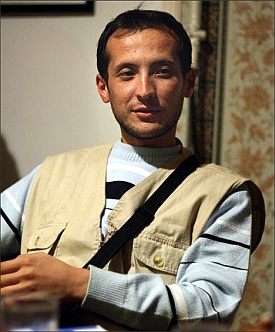In writing this column, I have often taken the most embarrassing members of the profession to task: the shameless sycophants, the suck-ups who seek out those in positions of wealth and power and do their dirty work; the log-rollers. They are almost too numerous to count, and they seem to grow more entrenched every year.

But there are also real heroes in the world of journalism, and some of them can be found in the most unlikely places. One of them was my young friend Alisher Saipov, who was murdered today in the ancient Silk Road city of Osh. He had just turned 26 when he died. The single word that best described Saipov was fearless.
An ethnic Uzbek residing in Kyrgyzstan, Saipov had staked out a critical beat—the Ferghana Valley. This is the historical heartland of Central Asia, its most densely populated strip, divided between three nations. Like most of the population of the Ferghana, Saipov was an ethnic Uzbek. He was very concerned about the conditions in Uzbekistan, now governed by a brutal Stalinist dictatorship and among the most corrupt nations in the world. In May 2005 there was a popular uprising in Andijan—just across the frontier from Osh—which was violently put down by the Uzbek dictatorship. Hundreds of Uzbeks were mowed down by gunfire, and their bodies quickly disposed of in shallow graves. The Uzbek Government worked feverishly to cut the country off from the world and to prevent word getting out about the massacre.
A number of brave journalists and human rights workers got the story of the massacre out, and documented it with photographs. But few if any played quite so effective and powerful a role as Saipov. He was the key Central Asia reporter for Voice of America, Radio Free Europe, Radio Liberty and other broadcasters, and he founded his own journal focused on political and economic developments in Uzbekistan. In his reporting, Saipov put his life on the line, repeatedly. And in the following years, he was the journalist to whom everyone turned for information about what was happening. I turned to Alisher often to understand what was happening, and there is no one whose opinion I ever found more reliable. He always succeeded in drawing out the details, the incessant power plays that mark Uzbekistan’s politics, the acts of repression and petty corruption. He was a bright spotlight on the Uzbek leadership, he was unflappable and incorruptible.
Last night Saipov was shot by an assailant using a gun with a silencer, just as he left his office in Osh. It was clearly an act of political assassination, and suspicions will immediately fall on one party, already known to use assassination as a tool to eliminate its enemies. Shortly before his killing, Saipov received repeated death threats and came under heavy attack on Uzbek state television. It was clear that he was being targeted. Saipov ignored these threats and plowed ahead with his work. His courage knew no limits, but an assassin’s bullet has put an end to his career. His death is a great loss for Central Asia and for the journalists’ profession.


